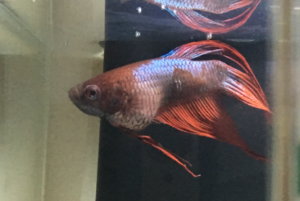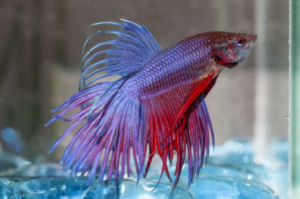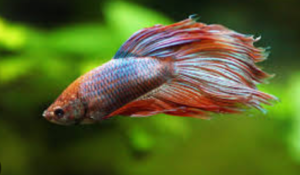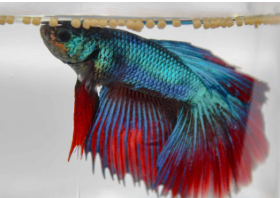Betta fish, known for their stunning colors and flowing fins, are a popular choice among aquarium enthusiasts. However, these captivating creatures can experience health issues, one of the most common being bloating. A bloated Betta fish can be alarming for owners, but understanding the causes, signs, and treatments can make a significant difference in their well-being. This article dives into everything you need to know about bloated Betta fish, ensuring your pet receives the care it needs.
What Does Bloating Look Like in Betta Fish?

Bloating in Betta fish typically appears as an enlarged or swollen abdomen. In some cases, the swelling may be accompanied by:
- Protruding Scales: Known as “pineconing,” this occurs when the scales stick out due to internal pressure, resembling a pinecone.
- Difficulty Swimming: A bloated Betta may struggle to swim properly or maintain balance in the water.
- Reduced Activity: The fish may become lethargic and less interested in exploring their environment.
- Loss of Appetite: A bloated Betta might refuse food or eat less than usual.
Recognizing these signs early is crucial for effective treatment.
Common Causes of Bloating in Betta Fish

Bloating in Betta fish can stem from a variety of causes, ranging from dietary issues to serious medical conditions. Let’s explore the most common causes:
1. Overfeeding
Betta fish have small stomachs, roughly the size of their eye. Feeding them too much or too often can lead to bloating as their digestive system struggles to process the excess food.
2. Constipation
A diet lacking in fiber or high in processed foods can result in constipation, causing the fish’s abdomen to swell.
3. Swim Bladder Disorder (SBD)
The swim bladder is an organ that helps Betta fish maintain buoyancy. When this organ is affected due to overfeeding or injury, it can lead to bloating and swimming difficulties.
4. Dropsy
Dropsy is a serious bacterial infection that causes fluid retention in the fish’s body. It is often accompanied by pineconing scales and requires immediate attention.
5. Parasites
Internal parasites, such as nematodes or protozoans, can invade the Betta’s gastrointestinal tract, causing swelling and discomfort.
6. Infections
Bacterial or fungal infections can result in inflammation and bloating. These are often secondary to other health issues or poor water quality.
How to Treat a Bloated Betta Fish

The treatment for bloating depends on the underlying cause. Follow these steps to help your Betta recover:
Step 1: Assess and Improve Water Quality
A clean tank is vital for your Betta’s health. Test the water for:
- Ammonia: Should be 0 ppm
- Nitrite: Should be 0 ppm
- Nitrate: Should be below 20 ppm
- pH Levels: Ideally between 6.5 and 7.5
- Temperature: Maintain between 76°F and 82°F (24°C – 28°C)
Perform regular water changes and use a water conditioner to remove harmful chemicals.
Step 2: Adjust Feeding Habits
- Fasting: Stop feeding your Betta for 1-2 days to allow their digestive system to process any remaining food.
- Introduce Fiber: Offer a blanched pea (deshelled and mashed) to help relieve constipation. Feed a tiny portion.
- Smaller Meals: Feed smaller portions 1-2 times a day using high-quality Betta-specific pellets.
Step 3: Quarantine and Medication
If the bloating persists or worsens, consider:
- Quarantine Tank: Move the Betta to a separate tank to prevent the spread of potential infections.
- Salt Baths: Dissolve aquarium salt (not table salt) in the quarantine tank at a ratio of 1 teaspoon per gallon. Limit exposure to 15 minutes per day.
- Medications: Use antibacterial or antiparasitic medications specifically designed for fish. Always follow the dosage instructions carefully.
Step 4: Seek Veterinary Help
For severe cases, such as Dropsy or parasite infestations, consult an aquatic veterinarian. They can provide a definitive diagnosis and advanced treatment options.
How to Prevent Bloating in Betta Fish

Prevention is the best strategy to ensure your Betta remains healthy. Here’s how you can minimize the risk of bloating:
- Balanced Diet: Feed a variety of foods, including high-quality pellets, frozen or live brine shrimp, and bloodworms. Avoid overfeeding.
- Routine Tank Maintenance: Perform weekly water changes (25-50%) and clean the substrate to remove waste and uneaten food.
- Monitor Tank Conditions: Use a reliable water testing kit to maintain optimal water parameters.
- Observe Behavior: Regularly check your Betta for signs of stress, illness, or unusual behavior.
When to Worry About Bloating
While occasional bloating due to overeating isn’t uncommon, certain symptoms indicate a more serious issue. Seek immediate help if your Betta shows:
- Pineconing scales
- Difficulty breathing or swimming
- Persistent bloating despite fasting
- Red or inflamed areas on the abdomen
Conclusion
A bloated Betta fish can be concerning, but with prompt action and proper care, most cases can be resolved. By understanding the causes, recognizing the signs, and following the appropriate treatments, you can ensure your Betta remains happy and healthy. Regular tank maintenance, a balanced diet, and attentive care are the keys to preventing bloating and other health issues.
Always remember, if in doubt, consult an aquatic veterinarian for professional advice. Your Betta fish relies on you for its well-being, and a little extra effort can go a long way in keeping your vibrant friend thriving.
